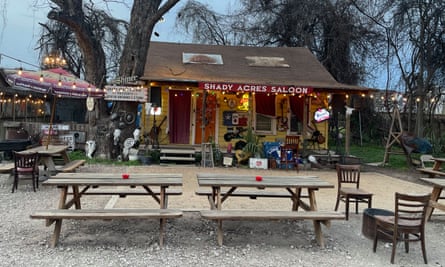Beyoncé’s record-breaking hoedown Texas Hold ‘Em has prompted debate about belonging in country music. Patrons in her Texan hometown have their say on the song

Beyoncé in New York City, 13 February 2024. Photograph: James Devaney/GC Images
The Shady Acres saloon is a hole-in-the-wall country dive bar about eight miles north-west of Beyoncé’s childhood home in Houston, Texas. On a Wednesday evening, a few pickup trucks are parked out front. Inside there is a wooden bar with dollar bills stapled to the ceiling. Texas beers such as Shiner Bock and Lone Star are on tap and a jukebox near the pool table plays Willie Nelson, Waylon Jennings and Jeannie C Riley’s Harper Valley PTA. Beyoncé’s new song, the cheeky hoedown Texas Hold ’Em – which recently made her the first Black woman to top Billboard’s country music chart and is currently in its second week at UK No 1 – isn’t on the playlist.
Beyoncé has never been shy about voicing her Texas pride, but what some people perceive as her sudden switch to country on her forthcoming album, after the house music history lesson of her 2022 album Renaissance, has prompted debate on her country bona fides. Some country radio stations refused to playlist her new song – though one in Oklahoma had to back down after an online campaign. Some diehard country music lovers are questioning whether her new songs should even be considered country, reactions that overlook the genre’s Black roots – and Beyoncé’s history with the genre, from the song Daddy Lessons, from her 2016 album Lemonade, to the stetsons worn by Destiny’s Child. Last month, her mother, Tina Knowles, stepped in to shed light on the family’s history with rodeo culture, and Dolly Parton congratulated Beyoncé on her success and heralded her excitement about the forthcoming record.

The patrons at Shady Acres have mixed feelings. “Look at this place we’re at,” says Cliff Boatwright, 55. He’s wearing jeans and a camouflage print baseball cap, sipping beers with a friend who asks to be known as Jim, 47. “I guarantee you Beyoncé has never stepped foot in here.”
That’s probably true, since Beyoncé can’t waltz into a dive bar without a gaggle of bodyguards. The real question, though, isn’t whether Beyoncé goes to country bars. It’s whether her new songs will be embraced by the people who frequent them, people who like to see Willie and Waylon on a jukebox, and not necessarily a superstar who rocketed out of Houston on a wave of fame that started with R&B and pop hits such as Say My Name. Boatwright and Jim have both heard Texas Hold ’Em. They agree that Beyoncé has the right to make any type of music she wants to create. That doesn’t mean they think the song is country.
“She can do what she wants as an artist,” says Boatwright. “If you don’t explore different things you become stagnant, but at the same time it’s just not country to me.” Country isn’t just about a certain twang to the guitar, he says, or throwing on a cowboy hat and saddling up a horse, especially if it’s Beyoncé’s hologram horse. It’s about storytelling, telling tales about the working class, writing music that “speaks to the soul”. Beyoncé’s success has catapulted her far away from everyday people just trying to get by, says Jim.
“It doesn’t matter that you came from Texas. It matters if you’re actually living a country lifestyle. It bothers me that her song is being called country.”
Beyoncé may be the first Black woman to top the country music charts, but she’s not the first Black country singer to have a hit. In 1981, the year Beyoncé was born, Charley Pride had a song at the top of the Hot Country Songs chart called Never Been So Loved (In All My Life), alongside Merle Haggard, Dolly Parton and Hank Williams Jr. Linda Martell was the first Black woman to break into country and the first to play on the Grand Ole Opry stage. Texas-born Mickey Guyton is breaking barriers in country, and Hootie and the Blowfish frontman Darius Rucker successfully made the switch to country. So why all the fuss over whether she is or isn’t real country?
At Shady Acres, Colin Goodnight, 42, a musician from Houston, is all for Beyoncé’s new sound. “I love the fact that she’s branching out,” he says. Bryant Bell, a Beyoncé fan, doesn’t love the new song, but that doesn’t mean he thinks it’s not country. His friend Melissa Higginson hasn’t heard it yet but says she’s going to listen. “She’s got a beautiful voice,” she says. “Good for her for trying to break a boundary.”

The Armadillo Palace. Photograph: Dina Gachman
Later on at Bandits Dancehall, which is about two miles from Beyoncé’s childhood home, about 20 boot-clad people are taking a two-step lesson on the dancefloor. Bartenders Payton and Darian say they haven’t heard the song played at Bandits yet, though Payton knows it from TikTok. The Armadillo Palace is a sprawling restaurant and dance hall that has engraved plaques bearing names of Texas-born musicians including Lyle Lovett, Willie Nelson and Lightnin’ Hopkins embedded into the floor. Graphic designer Risa Marie, 37, loves Texas Hold ’Em, she shouts over the music playing from the speakers. “I listen to it on repeat. She’s a talented musician. As an artist there are different styles I can draw in. Why shouldn’t she be able to do the same with music?”





